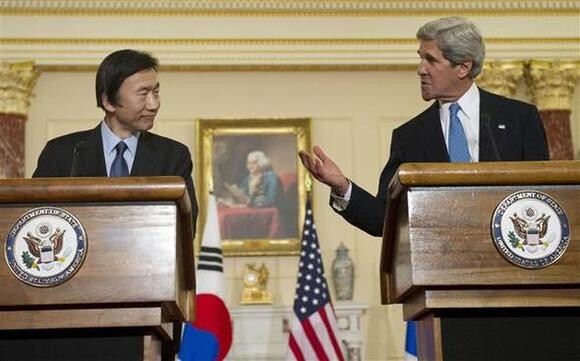hankyoreh
Links to other country sites 다른 나라 사이트 링크
The chances of dialogue between N. Korea and the US

By Park Hyun, Washington correspondent
The tense situation on the Korean Peninsula is drawing major attention from the international media, with some raising the possibility of a military clash between North and South.
The tensions have been front-page news for more and more newspapers recently, while news TV programs have also given the issue major coverage. The situation now could be enough to push Washington into taking steps toward dialogue with Pyongyang.
But it has not shown any signs of doing so yet. The US government certainly is acutely aware of the need for dialogue to make a breakthrough in relieving the tensions. A senior diplomatic source said there was “growing concern” in Washington about the possibility of a clash erupting.
So why has Washington be so reluctant to take action? Part of this is due to the awkwardness of taking action amid an ongoing offensive from Pyongyang, but analysts also attributed it to a kind the aftereffect of failed negotiations with North Korea in the past.
“You don’t see anyone [in Washington] willing to take the initiative in dialogue with Pyongyang,” said a diplomatic source. “I think that after the February 29 agreement [in 2012] fell through after just 16 days, there’s more of a sense that you’ll only get hurt by leading the push for negotiations.”
Indeed, some have seen the 2009 departure of Christopher Hill, a leading proponent of negotiations who spearheaded the six-party talks as Assistant Secretary of State during the George W. Bush administration, as a “resignation in disgrace” after failing at dialogue with North Korea.
This explains why the US is maintaining that North Korea first needs to show its sincere intention to denuclearize. In a sense, it is waiting to pursue “safe” negotiations after first seeing that its chances of failure are slight. Indeed, at a press conference after a bilateral meeting with the South Korean Foreign Minister on Apr. 2, US Secretary of State John Kerry said that the US was willing to talk to North Korea, but added that the country had to first show that it was going into negotiations with a genuine intention of ending its nuclear program.
Also adding to Washington’s reluctance is its increased emphasis on China’s role since last year. The idea is that Beijing should cooperate in using its considerable diplomatic and economic influence over North Korea to induce changes there.
The problem is that China has different strategic objectives. While there have been signs of change since late last year, there is little possibility of Beijing significantly reorienting its North Korea policy over a short time.
A diplomatic source noted that China was angry enough about North Korea rejecting its calls not to launch a long-range rocket last December that it agreed on a UN Security Council resolution sanctioning the country, but added, “We have no way of knowing how rigorously China plans to enforce the sanctions.”
This provides some explanation for Kerry’s recent call for South Korea to take action in improving inter-Korean relations.
A senior diplomatic source called it “actually very significant” that Kerry said improved relations would be “helpful” in achieving the goal of denuclearizing the Korean Peninsula, without mentioning a role for the US in improving relations with North Korea.
“I think his idea is that it would also benefit the US if things improved between North and South Korea first,” the source said.
Please direct questions or comments to [english@hani.co.kr]

Editorial・opinion
![[Column] Park Geun-hye déjà vu in Yoon Suk-yeol [Column] Park Geun-hye déjà vu in Yoon Suk-yeol](https://flexible.img.hani.co.kr/flexible/normal/500/300/imgdb/original/2024/0424/651713945113788.jpg) [Column] Park Geun-hye déjà vu in Yoon Suk-yeol
[Column] Park Geun-hye déjà vu in Yoon Suk-yeol![[Editorial] New weight of N. Korea’s nuclear threats makes dialogue all the more urgent [Editorial] New weight of N. Korea’s nuclear threats makes dialogue all the more urgent](https://flexible.img.hani.co.kr/flexible/normal/500/300/imgdb/original/2024/0424/7317139454662664.jpg) [Editorial] New weight of N. Korea’s nuclear threats makes dialogue all the more urgent
[Editorial] New weight of N. Korea’s nuclear threats makes dialogue all the more urgent- [Guest essay] The real reason Korea’s new right wants to dub Rhee a founding father
- [Column] ‘Choson’: Is it time we start referring to N. Korea in its own terms?
- [Editorial] Japan’s rewriting of history with Korea has gone too far
- [Column] The president’s questionable capacity for dialogue
- [Column] Are chaebol firms just pizza pies for families to divvy up as they please?
- [Column] Has Korea, too, crossed the Rubicon on China?
- [Correspondent’s column] In Japan’s alliance with US, echoes of its past alliances with UK
- [Editorial] Does Yoon think the Korean public is wrong?
Most viewed articles
- 1‘We must say no’: Seoul defense chief on Korean, USFK involvement in hypothetical Taiwan crisis
- 2Will NewJeans end up collateral damage in internal feud at K-pop juggernaut Hybe?
- 3[Column] Park Geun-hye déjà vu in Yoon Suk-yeol
- 4Why Korea shouldn’t welcome Japan’s newly beefed up defense cooperation with US
- 5Thursday to mark start of resignations by senior doctors amid standoff with government
- 6N. Korean hackers breached 10 defense contractors in South for months, police say
- 7[Guest essay] The real reason Korea’s new right wants to dub Rhee a founding father
- 8[Column] ‘Choson’: Is it time we start referring to N. Korea in its own terms?
- 9Kim Jong-un expressed ‘satisfaction’ with nuclear counterstrike drill directed at South
- 10[Editorial] New weight of N. Korea’s nuclear threats makes dialogue all the more urgent